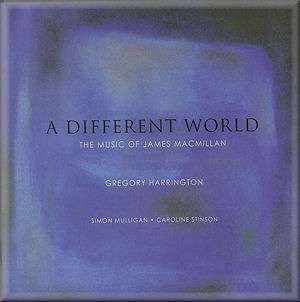|
Back
08/26/2011
James MacMillan: A Different World
Gregory Harrington (Violin), Simon Mulligan (Piano), Caroline Stinson (Cello)
Recorded at BiCoastal Music, Ossining, NY (3 & 6 August 2009) – 63’56
Estile Records, Ref. #: 391651 – Booklet with essays in English

Don’t let the title, “A Different World”, worry you. While it aptly describes the beautiful music of James MacMillan on this disc, the different world is comfortably familiar. All it takes is some attentive exploration and very soon the different world will feel like a place you would want to call home. It may be slightly hyperbolic to describe the album thusly, but not inaccurate. The lauded Scottish composer may be best known to listeners for his larger works, but this disc features some of his most intimate ones, three of which are world premiere recordings. From the playful Walfrid, on His arrival at the Gates of Paradise to the weighty Fourteen Little Pictures, it becomes clear that there is a profundity, yet at the same time, a simplicity to MacMillan’s music.
This music requires active listening, but not in the manner of Webern or a similar composer. Spending some time with this recording illuminates the structural, harmonic and melodic devices the composer is fond of using, but more importantly allows the user to connect on a very emotional level with the music. These are emotions we can all relate to and they make the composer’s humanity spring forth. MacMillan’s After the Tryst (based on William Soutar’s love poem) brilliantly brings the sensuousness of the verse to life. MacMillan is well served by his innate talent for narrative and dramatic timing, particularly in the pieces In angustiis I & II, which were his response to the terrorist attacks of September 11, 2001. The listener can vividly hear a physical response to the events: disbelief and anger in the first piece; reflection and sadness in the second.
The program opens with Kiss on Wood for violin and piano which, aside from being a beautiful piece, is a good introduction to the composer’s style – a style that is more easily demonstrated than described. In this case, the piece is built around a plainchant which is ornamented and dramatically expanded to sound almost improvisational. MacMillan prescribes blatantly emotional, but not artificial, sonorities and techniques in this devotional piece, with long glissandi, sustained pauses and weeping tones from the violinist. MacMillan’s skill with knowledge of Scottish folk music and ballad is deftly displayed and conveyed in After the Tryst and Walfrid, on His Arrival at the Gates of Paradise. The music is at once familiar (I am sure I am not the only one who hears the end of Walfrid as a variation on Catcher in the Rye). 25th May 1967, written when the composer was 8, is a wonderful, boisterous outburst with melodic fragments tossed here and there.
It is obvious to anyone picking up this disc, that it is a labor of love by violinist Gregory Harrington. The playing by all involved is emotional, committed and intimately in sync with the printed page. The musicians’ passion leaps off the recording and grabs the listener. The precision and musicality is impressive and that comes across clearly in the ensemble playing. Listen to the supporting piano in Kiss on Wood, the pregnant pauses and audible breaths are flawless in their effect. In A Different World, the roles are reversed and Mr. Harrington does a brilliant job of supporting Mr. Mulligan. Mr. Harrington plays with a beautiful and versatile tone that is appropriately raw when needed. He navigates the highest registers of his instrument with precision and confidence. Mr. Mulligan’s playing is fluid and impressive, particularly in the challenging 25th May 1967. The cellist, Ms. Stinson, joins the group seamlessly in Fourteen Little Pictures, playing with a firm and vibrant tone. The recorded sound is very well done, with a vivid and forward soundstage in the trio pieces. The thundering low-bass octaves of the piano are very well captured at the end of A Different World.
The great joy of this recording is the commitment of the artists to the music and the assurance that you are hearing almost exactly what the composer envisions. For music that requires a bit of active listening, that is a reward that is rare and well worth the journey to a different world.
Matthew Martinez
|